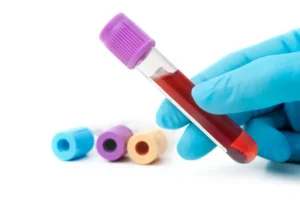
MaterniT21 is a blood draw based prenatal test that screens for fetal chromosomal abnormalities. Until recent years, detecting chromosome abnormalities required undergoing invasive procedures, such as amniocentesis or chorionic villus sampling that are considered reliable and accurate in diagnosing diseases but carry a certain risk for complications.
MaterniT21’s biggest advantage is that it is a non-invasive prenatal test, that is safe and poses no risk to both mother and fetus. Other non-invasive prenatal tests (also known as NIPTs) available today include the Verifi test and Harmony test.
When is the test recommended?
The test is available to all pregnant women. However, there are certain special cases in which the test is especially recommended to help detect or eliminate fetal chromosome abnormalities:
Advanced maternal age – the risk for chromosome abnormalities increases with maternal age. Considering this, women carrying triplets are recommended undergoing the test from age 27 and above. In twin pregnancies, the test is recommended to women aged 32 and above. In singleton pregnancies, it is recommended to women over the age of 35.
Abnormal test results – in certain cases, prenatal test results such as an ultrasound scan or nuchal translucency scan results, indicate a risk for certain genetic diseases. In these cases, a blood draw is recommended to help diagnose chromosome abnormalities.
Family history – since chromosomal conditions are hereditary, the procedure is recommended to women with a family medical history of the different chromosome abnormalities screened by the test.
Translocations – translocations are a genetic abnormality in which certain genes reattach to other genes at different locations. Women who are carriers of a translocation, or who’s partner carries a translocation, should undergo this test.
How is the test performed?
The test is performed like any routine blood draw. For the most effective results, two 10ml samples are drawn. Blood samples can also be collected from home, for greater convenience.
Samples are sent to a laboratory to be tested. Results are available within five days. No special preparations are required before undergoing this test.
Which diseases can the test detect?
The test screens for the most common chromosome abnormalities, that can also be detected by CVS or amniocentesis. Among these disorders:
Down syndrome – also known as trisomy 21, caused by three copies of chromosome 21 in all or part of fetal cells. Symptoms include intellectual disabilities, shorter life expectancy, heart defects, short stature, and more.
Edwards syndrome – caused by a trisomy (three copies instead of two) in chromosome 18. Symptoms include heart and kidney defects, small head size, profound intellectual disability, and a short life expectancy. Many babies with Edwards syndrome die during birth.
Patau syndrome – caused by a trisomy in chromosome 13. Symptoms include polydactyly, kidney defects, heart defects, intellectual impairment, and a life expectancy of only several days.
Turner syndrome – caused by a full or partial absence of the X chromosome. Manifests in various organ defects, short stature, and reproductive health problems.
Other disorders screened by this test include XYY syndrome (Jacobs syndrome), Klinefelter syndrome, triple X syndrome, DiGeorge syndrome, Cri-du-chat syndrome, Angelman syndrome, Prader-Willi syndrome, trisomy 22, trisomy 16, 1p36 deletion syndrome, Wolf-Hirschhorn syndrome, Langer-Giedion syndrome, and Jacobsen syndrome.

